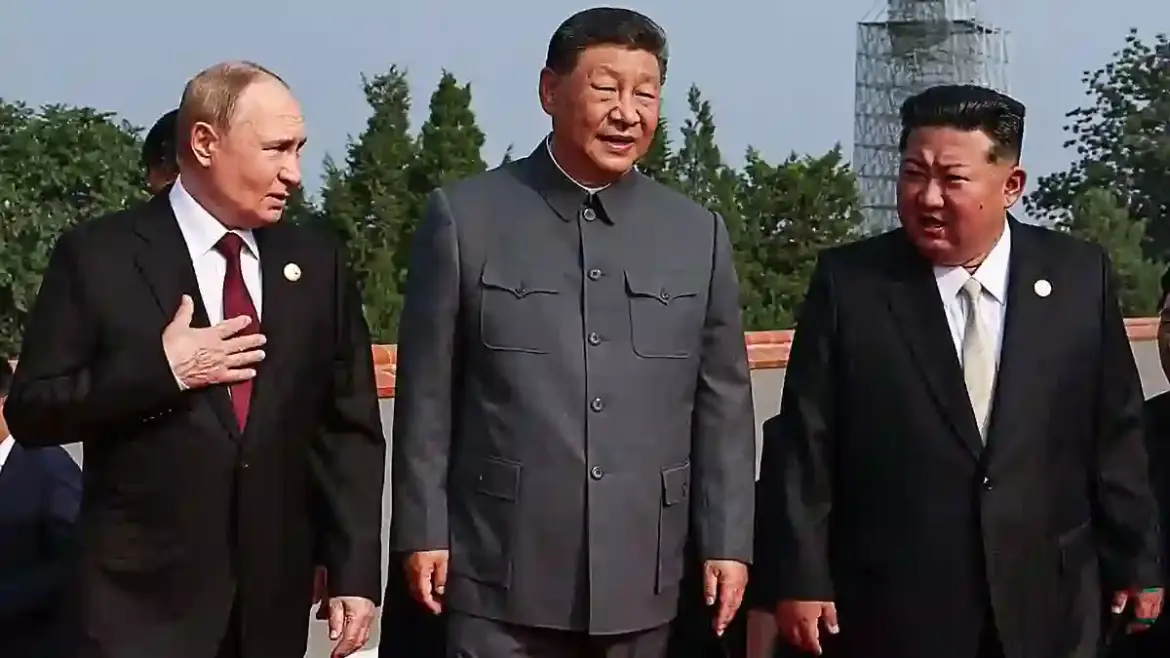On a day when the King candidly joked about the physical toll of aging past 70, a very different conversation was happening thousands of miles away.
Two of the world’s most powerful leaders—President Vladimir Putin of Russia and President Xi Jinping of China—were openly contemplating the possibility of living to 150.
The idea is striking, almost surreal, especially given recent images of China’s military parading through Beijing’s Tiananmen Square.
And the conversation didn’t stop there. North Korean leader Kim Jong-Un, just 41, was reportedly in the mix, apparently intrigued by the notion of leading his country for another 109 years.
If these leaders achieve their aims, the world could see them in power far longer than anyone alive today might expect.
A Glimpse Into Their Private Talks
As Putin and Xi walked ahead of a gathering of international dignitaries in Beijing, state media captured a startling snippet of dialogue.
Putin’s interpreter remarked: “Biotechnology is continuously developing. Human organs can be continuously transplanted.
The longer you live, the younger you become, and you can even achieve immortality.”
Xi, speaking in Chinese, chimed in: “Earlier, people rarely lived to 70. But these days, at 70, you are still a child.
Some predict that humans may live to 150 this century.”
While this might have seemed like casual speculation between two authoritarian leaders, Putin later confirmed that he and Xi had discussed ways to increase human life expectancy—a topic both have shown a keen interest in over the years.
Defying Mortality Is Part of Their Playbook
Both leaders have a history of defying norms around ageing and leadership.
Last year, Putin initiated the New Health Preservation Technologies research center, focused on combating ageing.
Its mission covers regenerative medicine, preventative healthcare, and extending active, healthy life spans.
China, meanwhile, has a long-standing and controversial organ transplant program.
Reports, including a 2021 United Nations study, suggest organs have been harvested from prisoners in detention, raising serious ethical concerns.
Putin’s Personal Quest for Longevity
Putin, in particular, seems almost obsessed with delaying death.
Peter Pomerantsev, a British-Ukrainian author and senior fellow at the London School of Economics, has described the Russian president as having “a particularly acute fear of death.”
Rumors about Putin’s health—including cancer and early Parkinson’s—have swirled for years, though never confirmed.
He reportedly takes extreme measures to safeguard his health, including bathing in Siberian deer blood and quarantining visitors for two weeks.
Russia’s TASS news agency reported a planned £2 billion investment in longevity research over the next five years, including bioprinting of organs and studies into cellular ageing.
The Science Behind Immortality Dreams
Bioprinting, a process where organs like hearts and livers can theoretically be created from living cells, is one area of focus.
Mikhail Kovalchuk, a 78-year-old close friend of Putin, has been pushing research into 3D bioprinting and leads Russia’s genetic research program, where Putin’s daughter Maria Vorontsova also works.
Vorontsova has received multi-million-pound grants for her work on cellular ageing.
China, home to the world’s largest elderly population, has also invested heavily in studying organ ageing and regenerative medicine.
Both nations are at the forefront of biotechnology, making their ambition to extend life spans even more tangible.
Medical Experts Sound the Alarm
Leading British medical professionals have reacted with alarm.
Sir Muir Gray, head of the Optimal Ageing Programme in Oxford, called the idea “bonkers” and stressed that the focus should be on quality of life, not simply longevity.
Richard Baker, vice president of the British Transplantation Society, criticized the notion of using organ transplants to extend life for the elite, emphasizing that organs are gifts from deceased donors, intended to save lives rather than fuel megalomaniacal ambitions.
The Global Quest for Longevity
The pursuit of extended life is not limited to world leaders.
The super-rich have made longevity a multi-billion-pound industry.
Tech billionaires like Peter Thiel and Jeff Bezos are investing heavily in anti-ageing research, from foundations aiming to make 90 feel like 50, to cutting-edge companies developing cellular rejuvenation technologies.
Even experimental enthusiasts like Bryan Johnson, a 46-year-old tech millionaire, are attempting to lower their biological age through strict diets, supplements, and advanced lifestyle interventions, awaiting the next breakthroughs in longevity science.
Ethical Concerns and Chilling Implications
While technology races forward, ethical questions remain.
Medical professionals worry about the origins of organs and the morality of attempting to cheat death at such a scale.
For many, the notion of Putin promoting long life while continuing military aggression in Ukraine paints a stark, almost terrifying picture of power intertwined with an obsession with immortality.
In the end, as humanity debates the boundaries of science and ethics, the ambitions of Putin, Xi, and even Kim Jong-Un serve as a reminder that the quest for longevity can carry consequences far beyond personal health—it can reshape politics, ethics, and the global order.
